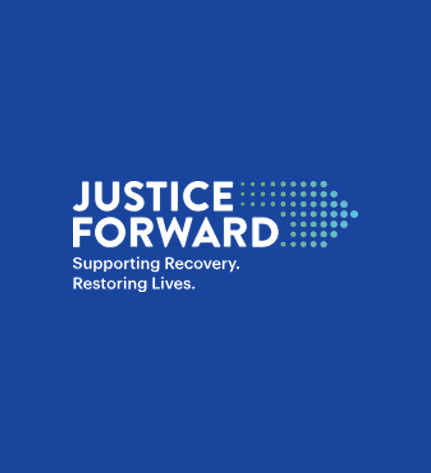Our new Program Manager on why she’s passionate about our work and what she’s planning on doing to help us next.
In the recovery community, there is growing recognition that trauma and/or grief play a major role in substance use disorder. To ensure successful long-term recovery, both issues must be addressed in a therapeutic setting, which is why Justice Forward funds trauma and grief therapy for Specialty Court clients and graduates. Trauma counseling has become a major part of the services we provide, so I reached out to Linda Kagey, a licensed chemical dependency counselor who provides therapy to Justice Forward clients, for a deeper dive into what trauma counseling is and why it’s so important to the recovery process.
What is trauma counseling?
Linda Kagey: I think to best understand trauma therapy, it is first important to know what trauma is. Trauma is any event, or series of events, that cause an individual physical or emotional harm. Trauma impacts the way a person functions and can have lasting adverse effects on the individual’s physical, social, emotional, spiritual, occupational, and financial well-being.
Trauma does not discriminate. …It can affect individuals, families, groups, communities, and cultures regardless of race, ethnicity, age, sexual orientation, gender, socioeconomic status, or geographic region. A traumatic event can be experiencing a natural disaster, physical pain or injury, serious illness, war, death of a loved one, divorce, domestic abuse, sexual assault, incarceration, homelessness, neglect, emotional abuse, witnessing a stabbing or shooting, bullying, terrorism, racism…or any other event that causes an individual to feel severe distress.
When a person experiences something traumatic, it triggers their “fight, flight, or freeze” response, making it difficult to cope and leaving them feeling afraid, vulnerable, and helpless. That’s where trauma counseling comes in. Trauma counseling is a client-centered approach that teaches the individual what trauma is and how it impacts the body. Trauma therapy normalizes trauma symptoms and validates the experiences of the client. Trauma disrupts a person’s sense of safety. Trauma therapy creates a safe place for survivors to process their thoughts and feelings about what has happened to them. After establishing safety, the therapist should work with the client to define recovery and what it means to the individual client. Trauma therapy helps clients identify their triggers and teaches them healthy ways to cope and function.
How can it benefit people in recovery from substance use disorder?
LK: Many people who have experienced a trauma will use a substance to mask the feelings and give them some temporary relief. Likewise, most people with substance use disorders have experienced trauma growing up and/or in their adult life. People who have experienced trauma that also abuse substances have far worse treatment outcomes than those who do not have a history of trauma. Recovery from substance use is more difficult for people who have been impacted by trauma. It is important that an individual receives both trauma and addiction treatment simultaneously to have the support necessary to sustain lasting sobriety.
What would indicate that an individual might benefit from this type of counseling?
LK: There are immediate and delayed responses to trauma. After going through something traumatic, if a person is experiencing emotional disturbances and/or emotional dysregulation, changes in sleep or appetite, suicidal ideation, or any other significant change in thinking, feeling, or behavior, they should seek out trauma counseling. Many times, people experiencing emotional dysregulation (ups and downs) will self-medicate by abusing substances with the intention of trying to regain emotional control. Ultimately, this causes further emotional dysregulation and dysfunction. Trauma therapy helps individuals with emotional regulation and cognitive processing (thinking clearly).
Is it helpful to have family members involved in the counseling? If so, why?
LK: Addiction is a family disease and affects everyone in the family, so it is important to have family members involved in addiction and trauma treatment. Oftentimes clients become involved in the Recovery Process because of positive family involvement and intervention. When family members are willing to learn about how addiction and trauma impact the body, mind and spirit, and are willing to support the individual throughout their healing journey, the entire family is strengthened. Family members are often a good resource to help identify an individual’s warning signs before a relapse into old self-defeating behaviors. Family members, when engaged in the recovery process, can be a positive reinforcement and motivating factor in helping them stay fully engaged in recovery.
What areas of improvement do you expect to see in a successful case?
LK: According to Bessel Van Der Kolk, one of the world’s leading experts on trauma, “The challenge of recovery is to reestablish ownership of your body and your mind—of yourself. This means feeling free to know what you know and to feel what you feel without becoming overwhelmed, enraged, ashamed, or collapsed. For most people this involves (1) finding a way to become calm and focused; (2) learning to maintain that calm in response to images, thoughts, sounds, or physical sensations that remind you of the past; (3) finding a way to be fully alive in the present and engaged with the people around you; and (4) not having to keep secrets from yourself, including secrets about the ways that you have managed to survive.”
The goal is to help clients learn the skills necessary to regulate their emotions without the use of substances or other unsafe behaviors. This requires the client to learn new coping skills that teach them how to tolerate distressing emotions. Trauma therapy also helps the client regain control over past experiences by allowing the client to re-narrate and begin to integrate their trauma story and make meaning of the event(s). Once the client has had the opportunity to integrate and process their past trauma, they begin to experience a decrease in depression, anxiety, dissociation, trauma-related shame or guilt, and/or intrusive thoughts like flashbacks and nightmares.



